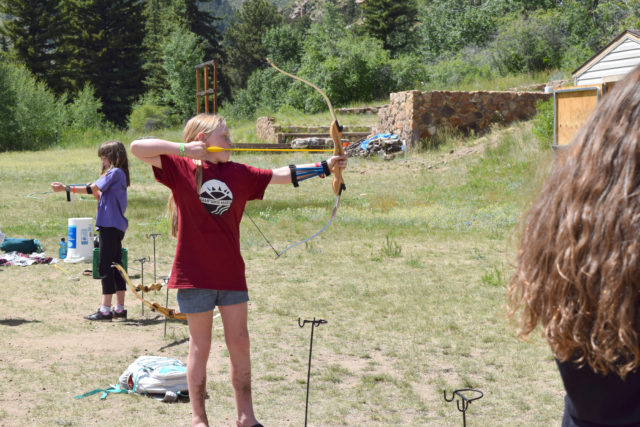
Being a teenager is complicated. So complicated, in fact, that many psychologists, such as Carl E. Pickford, have made a career of studying adolescents.
“More than ever before the young person wants freedom to be independent, but what he or she discovers is that freedom is one birthplace of boredom,” Pickford wrote in a 2009 piece for Psychology Today. “Now that you have more choice, what are you going to do with it? In many cases, the adolescent simply doesn’t know. The past is much clearer (‘How I don’t want to be any more’) than the future (‘How I want to be instead’).”
That limbo can be especially maddening for teens when summer rolls around.
The question is, how do adults keep teens from living on the couch the whole summer with only their phones as friends?
YMCA, a national organization for youth development, offers various summer camps aimed at helping adolescents build confidence and life skills through activities like kayaking, archery, mountain biking, skate boarding and more — and it keeps them busy and happy.
“In teen camp, they do more development, working to build them as a leader, building a community, making friends, building life skills,” says Becca Mack, a senior executive director at YMCA of Boulder Valley. “Something as simple as archery can develop so many assets in children, from confidence in hitting a target to being able to honor [their own] individual skills. ”
YMCA’s camp programs are based on skill tracks specific to age groups. For teenagers, programs focus on developing team building and problem-solving skills through challenging activities.
“As you get older, you get to progress through these skill tracks and do more of the exciting [activities] such as rock climbing that are more challenging for the older kids,” Mack says.
Alexander,13, a long-time camper at YMCA of Boulder Valley, says YMCA gave him an experience he otherwise would never have.
“I think going out and doing things so I’m not just sitting at home is important because both of my parents work full-time, and so I will be just sitting at home on my phone all day,” Alexander says. “All of my friends who go to Y camp with me, they just learn a lot of social skills and they get to go out and do more stuff, not just sit at home.”
He even volunteered for the first time with YMCA, helping setup and cleanup different activities.
Interacting with the campers from different backgrounds helps teens to nurture the empathy, responsibility and conflict-solving skills that prepare them to step into college and even future careers.
“Obviously if you are in camp, you might have kids who come from different environments, different backgrounds, different experiences,” Mack says. “During the summer camp, they are learning how to be empathetic, how to embrace other children and how to navigate conflict resolution. Say, one day they go to a college and they have a roommate that they don’t know, who is a stranger, and they have to navigate through that. They are able to carry the skill they learn at camp through their lives.”
Camp Santa Maria, a signature camp of YMCA of Boulder Valley located south of Denver, has counselors from all over the world, giving teens an opportunity to interact with people from different cultures as well. This overnight camp equip teens with inter-cultural understandings, an increasingly important skill in a world that can require workers to negotiate with people from various countries.
“It’s very interesting to see these people from different types of cultures who are able to teach us,” Alexander says. “There are a bunch of counselors in New Zealand, Australia, Wales, Scotland. I had one from France, and few from Canada, and just all around the world.”
The counselors are skilled at helping teens through the difficult issues specific to this age. Francisco Sandoval, a coordinator at YMCA of Boulder Valley, says communication is a key. Sandoval remembers when he talked to one camper about his parent’s divorce and discussed how to overcome the emotional stress.
“This was something I grew up with and was super open about. All it took to make them feel better about it was a talk on a long bus ride on one of our field trips.” Sandoval writes in an email. “Communication is a major key, and it’s the best way to help with any concerns and struggles specific to this age. They are old enough to understand how life works, and though they are young they have powerful minds that just look for somebody to try and understand them.”
YMCA teen camps also have a variety of activities to spark the interests of all participants and to help with engagement, which Mack says is especially important for this age group. Aside from Camp Santa Maria, YMCA offers Ultimate Teen Camps (many activities including amusement parks, go-carting and more), Adventure Camps (rocking climbing and paddle-boarding), Y Riders (cycling) and Skateboarding Camps specially designed for teens.
“When you have a group of 20 or something kids, you really have to look at all of those age groups and all of those kids, and make sure you’re tapping into all of their interests,” she says.
Teen-camper Alexander says it’s no big deal if campers don’t like a particular activity because “we always do something different 10 minutes later, and it is always a lot of fun.”
Not only does the YMCA make sure to find activities to suit the interests of every teen, they also make sure every teen who wants to attend gets to. As a state-funded youth development program, YMCA offers financial aid to anyone who needs it.
“We want every child to experience summer day camp,” Mack says. “So obstacles, like a family can’t afford it, cannot be a reason that children cannot attend the camp.”














